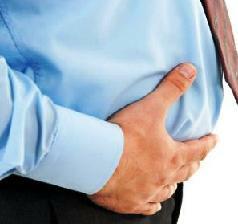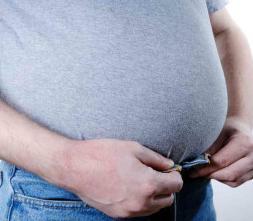 The increased gas formation in the intestine, the causes and treatment of which we will consider, is called meteorism.
The increased gas formation in the intestine, the causes and treatment of which we will consider, is called meteorism.
The composition of intestinal gases is air, it penetrates into the human body during inhalation, carbon dioxide, which forms during processing inhaled air, and gaseous impurities, which are formed as a product of microbial activity.
When a large number of such gases accumulate in the intestine, the stomach bursts, and it swells, then pain, discomfort, a large amount of gases with an unpleasant odor. There is flatulence due to the fact that a person malnutrition, abuse harmful habits. Often, increased gas production is the result of metabolic disruptions, if blood circulation is disturbed, there are problems with food movement.
How to deal with this symptom, and what can be done at home with the formation of gases in the intestine? We will try to understand. First of all, let us consider the causes of this phenomenon in adults.
Symptoms
Excess gas formation in the intestine is manifested by such symptoms as:
- heartburn;
- arriving pains in the abdomen;
- nausea, poor appetite;
- feeling of bloating in the abdominal cavity and rumbling;
- frequent belching of air and the passage of gases with an unpleasant odor.
Flatulence is often accompanied by a violation of the stool in the form of constipation or, conversely, diarrhea. Usually, after defecation or the escape of gases, pain and other manifestations subside for a while.
Causes of increased gas production in the intestine
Depending on the cause, the following types of meteorism can be distinguished:
- Alimentary- increased gassing, which is caused by ingestion of air, and also provoked by the consumption of products of "carminative" action.
- Mechanical flatulence. With normal digestion and gas formation in the intestine, its excretion is disturbed. A mechanical obstacle in this case can serve as intestinal tumors, helminths, tight stony stools
- Circulatory. It is associated with impaired blood supply to the intestinal wall
- High altitude flatulence.Appears due to differences in atmospheric pressure.
- Degustic flatulence. Lack of food enzymes or problems with normal bile secretion. From this, the normal process of digestion is disrupted. Products, not digested completely, break up into chemical elements, among which are gases. It is he who provokes bloating.
- Dysbiotic causes. In the small and large intestine there is a large number of microorganisms, which also participate in the digestion of the food mass. But in violation of the ratio of the number of bacteria of normal microflora (lactobacillus, bifidumbacterium) and opportunistic flora (peptostreptococcus, Escherichia coli, anaerobes), food digestion occurs with increasing gas production. This disorder is called dysbiosis.
- Dynamic causesare associated with a violation of innervation of the intestine and a decrease in its peristalsis (movements of the intestinal walls that push food masses). In this case, food stagnation occurs, fermentation processes are activated, and gases accumulate.
Regardless of the reason for the increased formation of gases in the intestine, the patient is recommended to consult a gastroenterologist. This condition can indicate serious diseases of the gastrointestinal tract. Since flatulence is a very uncomfortable and unpleasant condition, the patient is allowed to take certain medicines dispensed in pharmacies without a prescription (Espumizan, etc.).
Aerophagia
Many people ask themselves: why do gases form in the intestines? The most common cause of increased gassing in the intestine is the involuntary ingestion of excessive air by inhalation. This phenomenon is called aerophagy. Most of the air remains in the upper gastrointestinal tract, the remaining 15-20% enter the intestine.
Excessive ingestion of air can contribute to too fast eating, smoking and talking while eating, drinking carbonated drinks or chewing gum.
In the event that the aerophagy is provoked by features of a food intake, then this state is easily amenable to correction. However, if increased ingestion of air occurs due to diseases of the digestive or nervous system, then prolonged treatment is required.
Foods that cause gas formation
It is because of them there are reasons for strong gas formation in the intestine. These are legumes, cabbage, radish, kiwi, dates, grapes, black bread, beer, kvass, milk and other products containing difficult to digest components.
Because of untimely processing, they begin to wander and rot, so you should refrain from such a meal.
Diagnostics
The causes of the formation of gases in the intestine are detected using the following diagnostic methods:
- Fibroesophagogastroduodenoscopy. Do an examination of the mucous membrane of the gastrointestinal organs, using a special apparatus consisting of a fiber optic tube, lighting devices and a camera.
- Coprogramme. This laboratory study of feces, helps to detect the enzymatic deficiency of the digestive system.
- Roentgen of the stomach with bariumallows you to visually see the obstacles that prevent the advance of food masses and gases.
- Inoculation of feces for dysbiosis, to reveal violations of the ratio of intestinal microflora.
After a detailed diagnosis, it becomes clearer how to deal with increased gas production in the intestine, and what tablets should be taken to treat the disease.
Treatment of gas formation in the intestine
If you have increased gassing in the intestine, treating this symptom involves several consecutive stages:
- correction of diet and diet;
- treatment of the disease that led to flatulence;
- removal of gases accumulated in the lumen of the intestine;
- restoration of the motor function of the gastrointestinal tract by prescribing preparations from the prokinetic group (metoclopramide, tegaserod, silansetron);
- correction of the intestinal biocenosis by the appointment of biologics - acylact, Hilak forte, bifidumbacterin, Rioflora Immuno (see. list of probiotics, analogues of Linex).
To combat strong gassing in the intestine, adsorbents are actively used, which reduce the absorption of gases and other toxic compounds origin, and also contribute to the removal of gases (white clay, dimethicone, simethicone, polyphepan, polysorbent, activated carbon, Filtrim STI).
How to get rid of increased gas production in the intestine?
 The appointment of drugs that will help get rid of gassing in the intestine is possible only after conducting an appropriate examination to exclude pathologies of the organs of the gastrointestinal tract.
The appointment of drugs that will help get rid of gassing in the intestine is possible only after conducting an appropriate examination to exclude pathologies of the organs of the gastrointestinal tract.
If these were not found, you can proceed directly to the treatment of excessive gas formation.
- Regardless of the cause of flatulence, reducing gas helpsdietary recommendations. The diet will be described in detail below.
- The safest product with increased gas production is considered to beEspumizan, which has no obvious contraindications.
- If there is a decrease in intestinal motility, then they can be prescribedmeans for its stimulation, such as "Cerukal".
- Probiotics- preparations containing living bacteria of normal intestinal microflora (lactove, bifiform) to combat dysbiosis.
- Prokinetics- drugs that accelerate the passage of food through the esophagus. It is the slow passage of food provokes its decomposition, which means that the bacteria begin to work hard, causing bloating.
- Sorbents- bind and remove toxins from the intestine (fosfalyugel, enterosgel).
- Enzymatic preparations, containing digestive enzymes and improving the work of the digestive system (mezim, pancreatin).
- Anti-foaming preparationsimprove the absorption of gases in the walls of the intestine and reduce their tension. They affect the motility of the intestine and has a strong carminative action (dimethicone, simethicone).
- If there are constipations, the doctor can prescribelaxatives. A mild laxative effect is provided by preparations based on lactulose, such as "Dufalac" and "Normase."
- With abdominal pain may be prescribedantispasmodics: "Drotaverin", "No-shpa".
For gases caused by mechanical causes (intestinal tumors, constipation), treatment will depend on the specific disease. When tumors will be performed surgical intervention, long-term constipation is eliminated by the use of laxatives.
Diet
Diet with excess gas in the stomach provides for a complete failure or significantreduction in the consumption of certain products:
- mushrooms;
- alcohol;
- chewing gum;
- cereals: millet, pearl barley;
- bread Borodinsky, bread with bran;
- greens: spinach, sorrel, green onions;
- beans: peas, beans, chickpeas, lentils;
- carbonated drinks, tea mushroom, kvass, beer;
- fruit and berries: grapes, dates, kiwi, pears, apples, gooseberries, raspberries;
- digestible carbohydrates: fresh baking, baking, cakes and pastries, chocolate;
- whole milk, cream, ice cream, milkshakes;
- difficult to digest varieties of meat: goose, pork, lamb;
- raw and pickled vegetables, containing coarse fiber: cabbage of all kinds, radish, tomatoes.
Even after you know what foods are flatulence, and avoid them, the symptoms may persist for a while. In order to quickly get rid of them, it is recommendedinclude in the diet products that improve bowel motility:
- crumbly porridge from buckwheat;
- dairy products;
- bread from the wheat flour of yesterday's baking;
- boiled and baked vegetables and fruits.
It is important to eat according to the principles of fractional nutrition - 5-6 times a day in small portions, slowly chewing food carefully. Try to eat at the same time and do not abuse various spicy seasonings. Daily it is necessary to drink a sufficient amount of liquid. After all the symptoms of the disease have passed, you can somewhat retreat from a strict diet, but at the same time try to comply with all the recommendations of the doctor.

How to choose probiotics for the intestine: a list of drugs.

Effective and inexpensive cough syrups for children and adults.

Modern non-steroidal anti-inflammatory drugs.

Review of tablets from the increased pressure of the new generation.
 Antiviral drugs are inexpensive and effective.
Antiviral drugs are inexpensive and effective.



